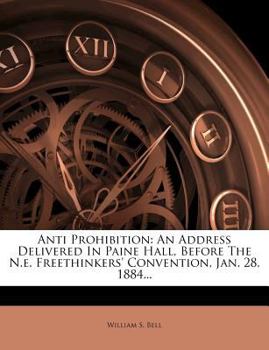Anti Prohibition: An Address Delivered in Paine Hall, Before the N.E. Freethinkers' Convention, Jan. 28, 1884...
Select Format
Select Condition 
Book Overview
In "Anti Prohibition," William S. Bell delivers a compelling address before the N.E. Freethinkers' Convention in 1884, offering a sharp critique of the temperance movement and the push for prohibition. This historical document provides valuable insights into the social and political debates of the late 19th century. Bell's arguments against prohibition reveal the complexities of the era, touching on issues of individual liberty, government overreach, and the role of morality in public policy.
This address offers a window into the freethinking perspective on a significant social issue, showcasing the intellectual challenges to the prevailing temperance sentiment of the time. "Anti Prohibition" is essential reading for anyone interested in the history of American social reform, the temperance movement, and the ongoing struggle between individual freedom and collective morality. This edition preserves the original text, ensuring its historical integrity and enduring relevance.
This work has been selected by scholars as being culturally important, and is part of the knowledge base of civilization as we know it. This work was reproduced from the original artifact, and remains as true to the original work as possible. Therefore, you will see the original copyright references, library stamps (as most of these works have been housed in our most important libraries around the world), and other notations in the work.
This work is in the public domain in the United States of America, and possibly other nations. Within the United States, you may freely copy and distribute this work, as no entity (individual or corporate) has a copyright on the body of the work.
As a reproduction of a historical artifact, this work may contain missing or blurred pages, poor pictures, errant marks, etc. Scholars believe, and we concur, that this work is important enough to be preserved, reproduced, and made generally available to the public. We appreciate your support of the preservation process, and thank you for being an important part of keeping this knowledge alive and relevant.





